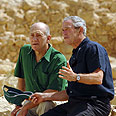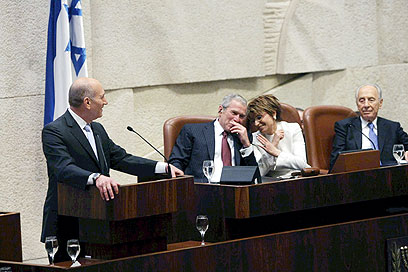

Arabs slam Bush's warm rhetoric towards Israel
Palestinians bristle at terminology used by US president in support of Israel, say religious analogies hailing Israelis as 'chosen people' prove Washington bias. Meanwhile Bush's Knesset address causes furor among Democrats back home who view denunciation of appeasement as jibe against Obama
While it remains unclear if US President George W. Bush's visit will yield any political gains in the race to achieve an agreement of any sort between Israel and the Palestinian Authority, it has certainly been an
eventful one; its echoes carried all the way back to the heated campaign trails leading to Washington.
US Democrats were outraged at what they perceived to be an attempt to equate presidential hopeful Barack Obama's willingness to engage Iran with those who advocated appeasing the Nazis.
"Some seem to believe we should negotiate with terrorists and radicals, as if some ingenious argument will persuade them they have been wrong all along," Bush said in his historic address before the Knesset on Thursday. He did not mention Obama by name or even seem to allude to any partisan divide on the hotly-debated isolation question.
''We have heard this foolish delusion before," he continued, "as Nazi tanks crossed into Poland in 1939, an American senator declared: 'Lord, if I could only have talked to Hitler, all this might have been avoided.' We have an obligation to call this what it is - the false comfort of appeasement, which has been repeatedly discredited by history.''

Bush with Olmert, Itzik and Peres (Photo: Alex Kolomoisky)
Obama responded with a statement, seizing on Bush's remarks even as it was unclear to whom the president was referring.
''It is sad that President Bush would use a speech to the Knesset on the 60th anniversary of Israel's independence to launch a false political attack,'' Obama said in the statement. ''George Bush knows that I have never supported engagement with terrorists, and the president's extraordinary politicization of foreign policy and the politics of fear do nothing to secure the American people or our stalwart ally Israel.''
White House press secretary, Dana Perino, denied Bush's comments were directed at Obama. ''I understand when you're running for office you sometimes think the world revolves around you," she said, "that is not always true. And it is not true in this case.''
Palestinians: This was a spit in the face
Speaking of the "promise of God" for a "homeland for the chosen people" in Israel, Bush told the Knesset after a visit to the Roman-era Jewish fortress at Masada: "Masada shall never fall again, and America will always stand with you."He predicted the defeat of Islamist enemies Hamas, Hizbullah and al-Qaeda in a "battle of good and evil".
Letting Iran have nuclear weapons would be an "unforgivable betrayal of future generations", he said.
Bush described the "bonds of the Book" - faith in the Bible shared by Christians like himself and Jews - as bolstering an "unbreakable" alliance between Israel and the United States. During a later visit to the Israel Museum, Bush, referring to the old biblical texts housed at the building, said "these documents tell the story of a righteous God and his relationship with an ancient people."
"There is no doubt in my mind that the patriarchs of ancient Israel and the pioneers of modern Israel would marvel at the achievements of this nation," he said.
But while the president's speech garnered a standing ovation among most Israeli lawmakers, it grated Palestinian nerves already on edge as thousands gathered to commemorate the 'Nakba.' Though Bush, in speaking of what he hoped the next 60 years would look like, said he envisioned for the Palestinian people "the homeland they have long dreamed of and deserved" – many saw the gesture as far too modest compared to the towering praise heaped on Israel.
Hamas slammed Bush's words as those more suitable to "a priest or a rabbi" and said the president had delivered a "slap in the face" to those Palestinians who placed their hopes in him.
Palestinian political analyst Ali Jarbawi said Bush's rhetoric showed Washington was not being an honest broker: "He is not talking about a two-state solution. He is talking about a state of leftovers for the Palestinians," Jarbawi said.
Reuters contributed to this report















